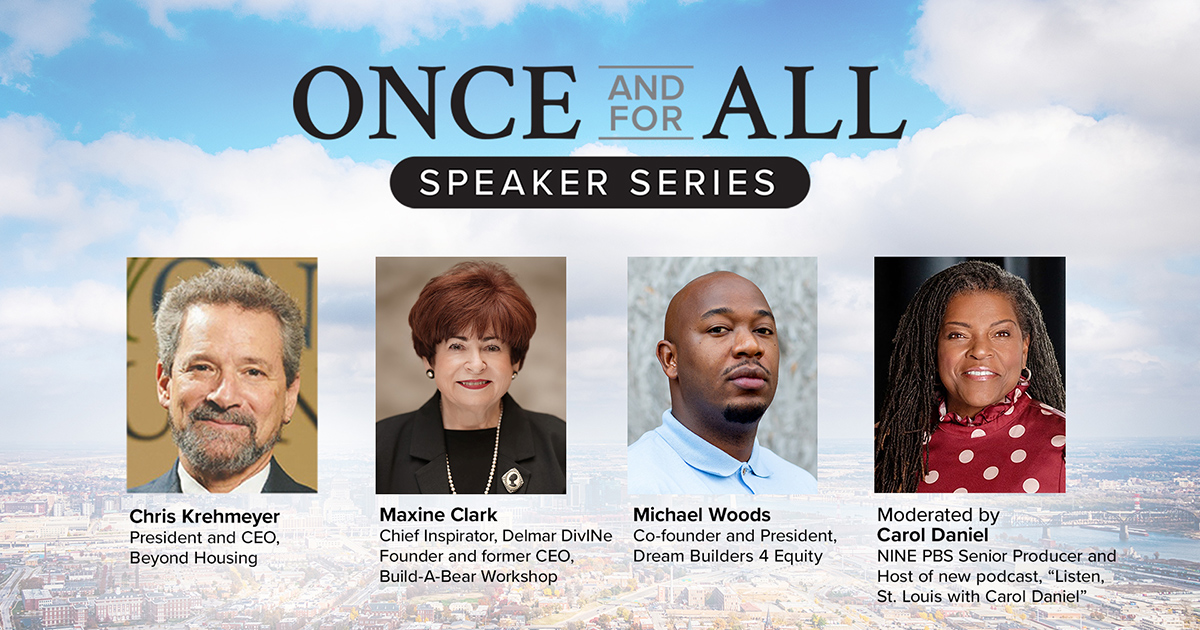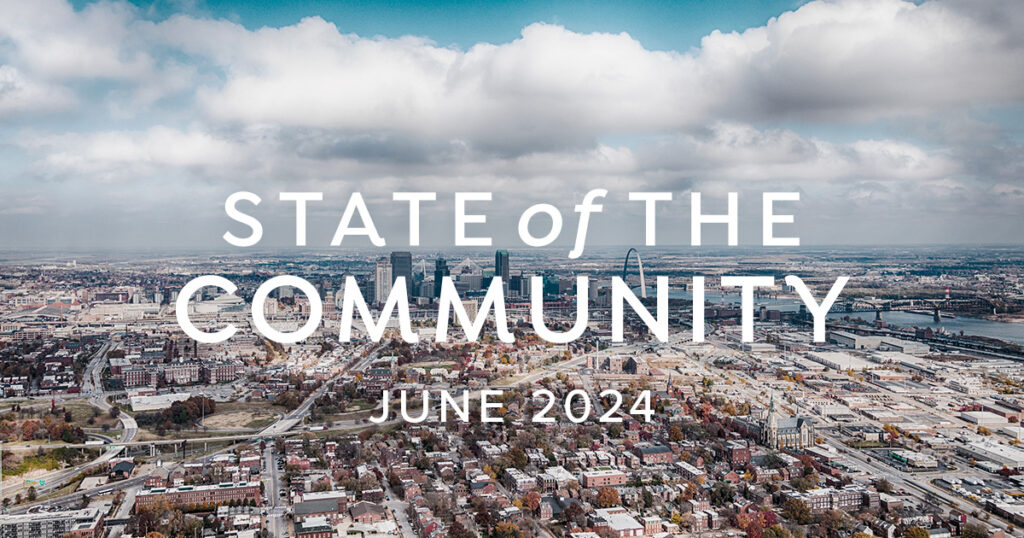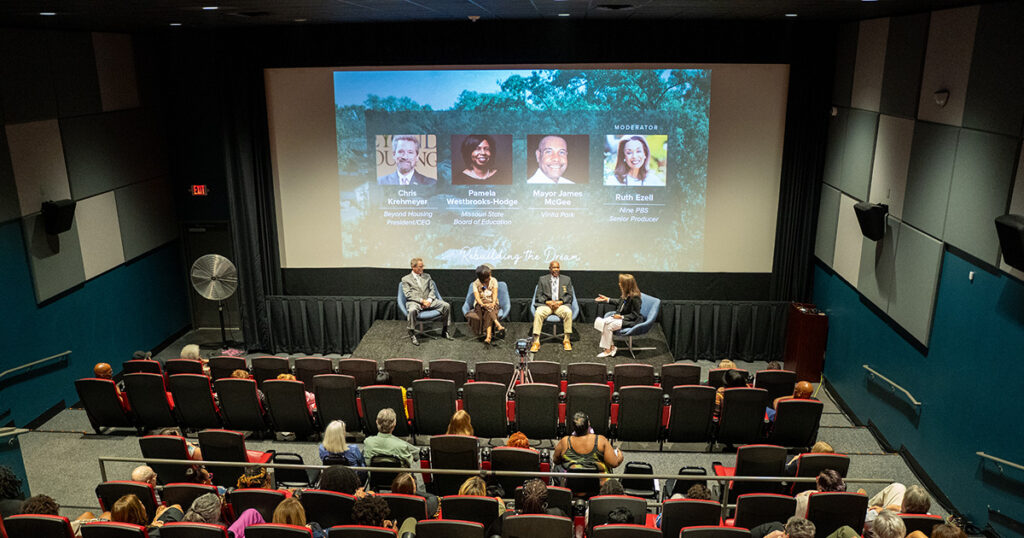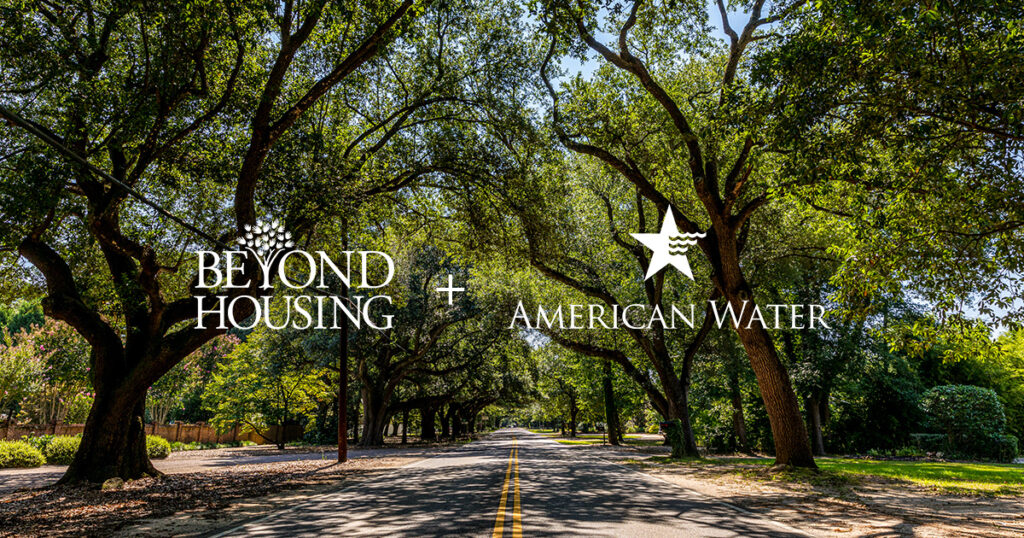How do we build a stronger St. Louis, once and for all?
That was the central question of Beyond Housing’s third Once and for All Speaker Series event on Thursday morning, March 14, at the Donald Danforth Plant Science Center.
The event brought three innovative developers together—Maxine Clark of Delmar DivINe, Michael Wood of Dream Builders 4 Equity, and Chris Krehmeyer of Beyond Housing—who are each focused on revitalizing communities within the north part of the St. Louis region that have suffered from decades of disinvestment and decline. Longtime St. Louis media personality Carol Daniel of Nine PBS led the discussion as each speaker shared their insights on the need to invest differently to move St. Louis forward—once and for all.
“If we want to see the region grow and be healthier, stronger, and vibrant, we have to invest in the places that have not had investment.”
—Chris Krehmeyer
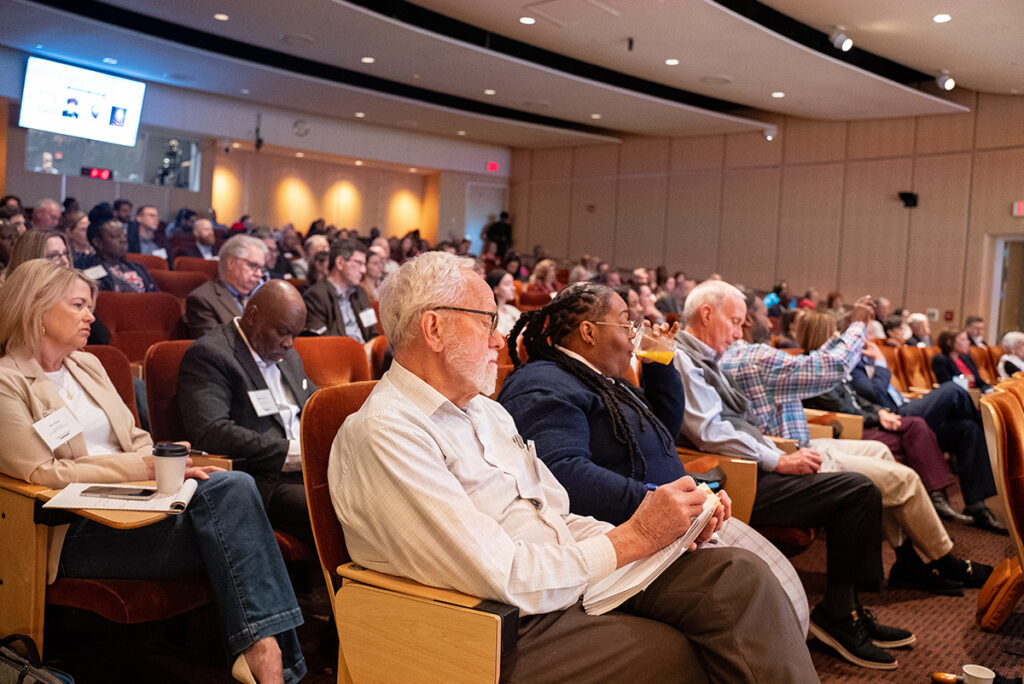
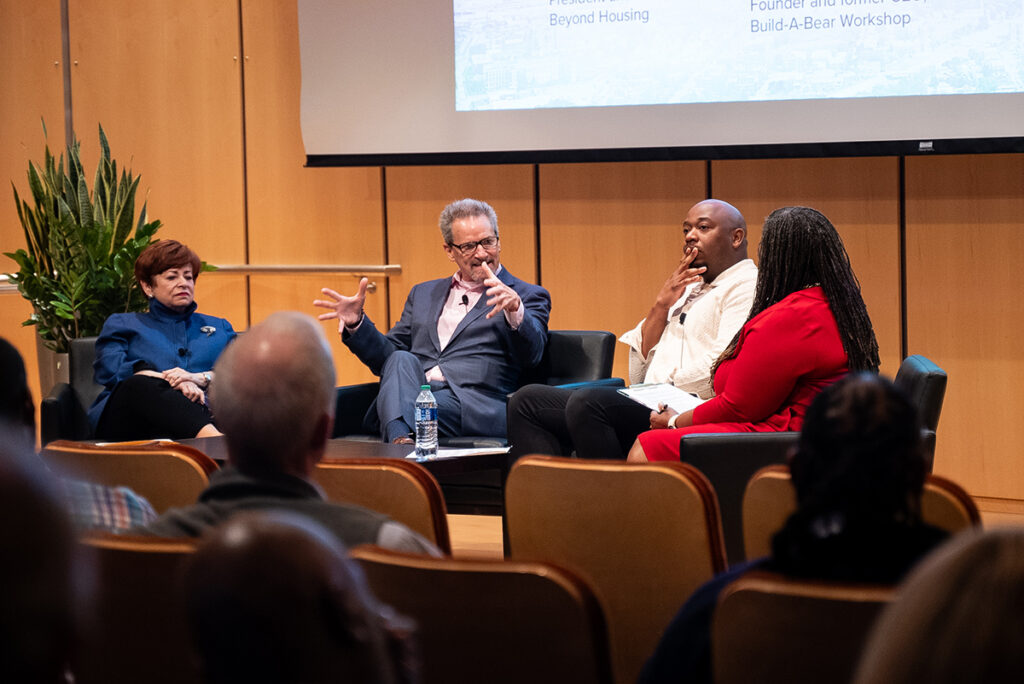
Investing in the people and places left behind
Each of these three builders is driven by the understanding that a region is only as strong as the communities within it—and that investing in people and places that have lacked investment is as important to the greater region’s success as new hotels, attractions and amenities, and cultural institutions.
“If we want to see the region grow and be healthier, stronger, and vibrant, we have to invest in the places that have not had investment, that have had systemic racism, that we know are deteriorating, where our schools and our public health systems don’t work very well,” said Krehmeyer.
Krehmeyer sees the issue as not an either/or but an and/and. Speaking of his alma mater, Washington University in St. Louis, “We need a Washington University in the region,” said Krehmeyer. “But it makes literally no sense to have opulence and wonderfulness so close to the exact opposite of that… communities that are deteriorated, don’t have solid housing, infrastructure is crumbling, and school systems don’t work.”
“Where we are on Delmar is a half mile right near Forest Park, the most beautiful park in the world,” said Clark. “We have buses and two metro stops. Why was this area left to decline? Why did we build the infrastructure if we didn’t intend to make it prosperous?”
—Maxine Clark
The strange disparity of investment in areas in such proximity was echoed by Maxine Clark, founder and former CEO of Build-A-Bear. Nine years ago, Clark saw an opportunity in the long-neglected former St. Luke’s Hospital building on the north side of Delmar Boulevard in the DeBaliviere Place neighborhood.
An avid historian of St. Louis neighborhoods with an affinity for the area, Clark launched Delmar DivINe. The opportunity was severalfold: to renovate the historic building into modern residences and retail; create a home and center for collaboration and innovation for St. Louis area nonprofits working to improve communities; and finally erase the infamous “Delmar Divide” that has historically relegated investment to the south of Delmar while excluding the predominantly Black, under-resourced communities to the north.
“Where we are on Delmar is a half mile from Washington University, right near Forest Park, the most beautiful park in the world,” said Clark. “We have buses and two metro stops. Why was this area left to decline? Why did we build the infrastructure if we didn’t intend to make it prosperous?”
Clark spoke about how the development has become an anchor in the community, reenergizing and restoring residents’ pride in their community, and surprising visitors who haven’t been in the area until recently. There is an added sense of security knowing that neighbors support and look out for each other.
Clark doesn’t see herself as a savior—she is simply fulfilling her obligation to help create greater opportunity for more of our region’s residents. “My grandparents came from someplace else with an eye for what might be for me. We have to think about what opportunity this region can create for so many more people.”
Believing that all things are possible
Just a short distance from Krehmeyer and Clark’s work, Michael Woods and then-partner and co-founder Neal Richardson (who is now head of the St. Louis Development Corporation) were also thinking outside the box to do something remarkably innovative in North St. Louis City.
“When those young people went to the house and saw the walls falling down and caving in, they didn’t believe that it could even be restored. That experience gave them living proof that all things are possible.”
—Michael Woods
Located near Crown Candy Kitchen, Dream Builders 4 Equity was created to “tackle the vacant home epidemic that’s plaguing North St. Louis City,” said Woods.
Through its Summer Youth Academy program, the organization hires young people ages 16 to 24 and pairs them with minority contractors to rehabilitate dilapidated homes. Woods said the youth are paid between $15 and $20 an hour and also receive a percentage of the property sales in the form of scholarships. The youth then journal their experience in poems and stories, which are then sold as books. The youth retain ownership of their work and receive revenue from the sale of each published book.
The experience has been transformative—for the community, Woods, and all of the youth who participate. “When those young people went to the house and saw the walls falling down and caving in, they didn’t believe that it could even be restored. That experience gave them living proof that all things are possible,” said Woods, describing their first completed rehab.
Tying it all together
“We can’t fix schools or crime unless we have stronger housing, stronger families, better access to jobs, and better health care. It’s all connected together, and our solutions historically have been one-offs.”
—Chris Krehmeyer
All three speakers spoke about the need for more nonprofits to collaborate together and for funding to flow to those working to create a bigger impact.
“Everything in community is interconnected,” said Krehmeyer. “We can’t fix schools or crime unless we have stronger housing, stronger families, better access to jobs, and better health care. It’s all connected together, and our solutions historically have been one-offs.”
For the last ten-plus years, Beyond Housing has built an extensive infrastructure of staff, programs, and nonprofit partners to serve a comprehensive range of needs of families and the greater 24:1 Community—an area comprised of multiple municipalities within the Normandy schools footprint.
In addition to building affordable new rental homes and rehabbing existing homes throughout the area, Beyond Housing and its partners provide holistic services to strengthen families renting each of the more than 600 rental homes. This is just one part of the organization’s work, which also addresses needs in education, health, economic development, municipal government, and more.
The holistic effort is paying off in communities like Pagedale, where property values have risen dramatically since 2013, and crime has also fallen.
The speakers believe collaboration is key to moving the ball forward. Citing the work of his own organization and so many others, Woods said, “We are understanding how valuable we are together. I know this stuff is hard, and it’s going to take some time, but I do think things are actually changing right now.”
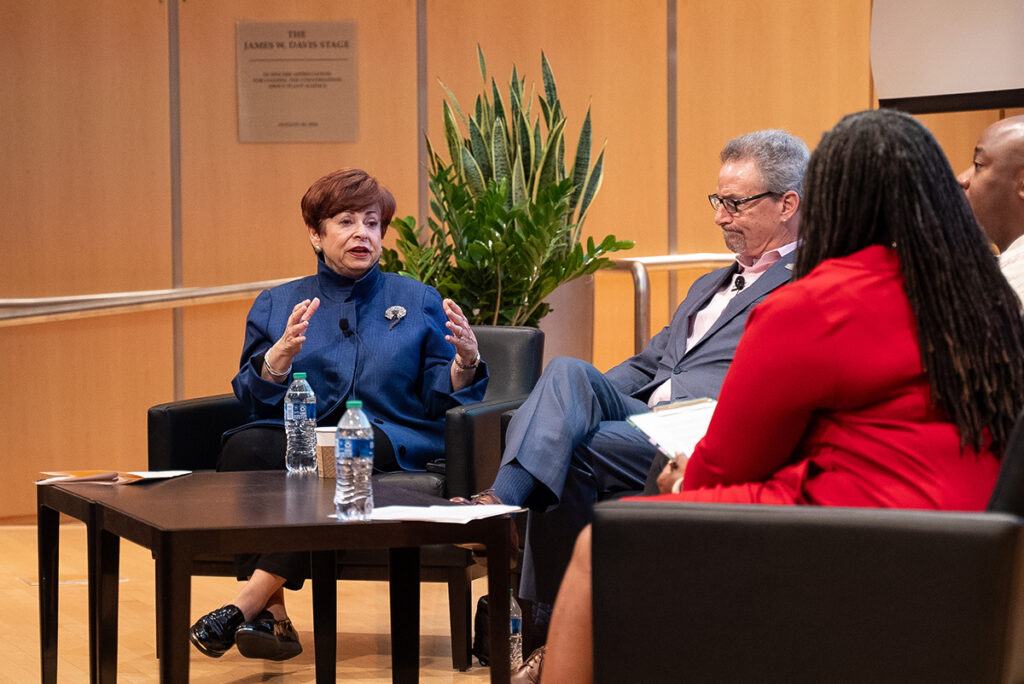
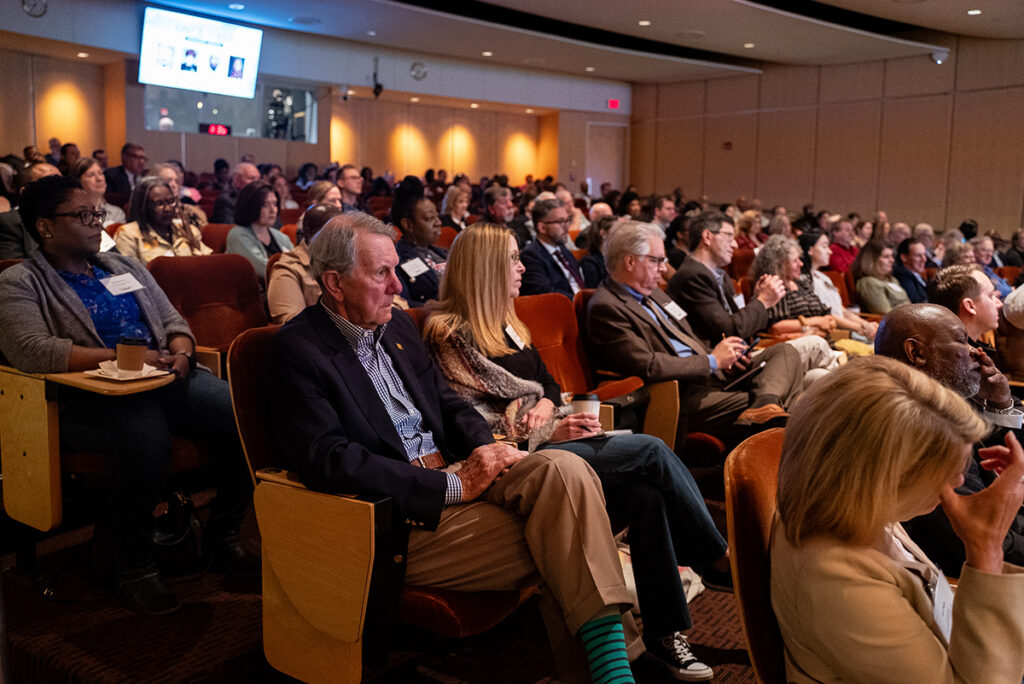
Addressing our problems, once and for all
“We are not proud of St. Louis. That’s one of our problems. The other is to think other people are not worthy of the goodness you have. If you’re proud of this region, you’ll be proud of all of it, and you’ll want it all to rise.”
—Carol Daniel
Carol Daniel closed the event with a passionate summary of what she believes are two of the biggest problems holding our region back. The first she believes is that, far too often, “We are not proud of St. Louis. We have an identity crisis. We’re so self-deprecating.”
She believes we need to feel proud of our city and that, as individuals, we must feel worthy of our own role to play.
In addition to our own worthiness, “The other problem is to think other people are not worthy of the goodness you have,” said Daniel. “We have two massive emotional, spiritual, and moral hurdles to overcome,” she said. “If you are proud of this region, you’ll be proud of all of it, and you’ll want it all to rise, and you will believe that other people are worthy.”

